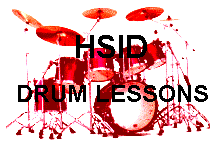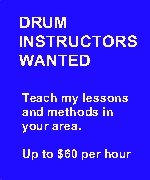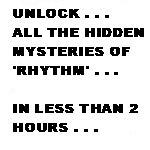 

Lesson Menu #2
Intermediate & Advanced.
Lesson Menu #3
Advanced & Ultra-Advanced.
Lesson Menu #4
Text lessons: All levels.

PRODUCTS:

GET ALL THE PRODUCTS AT ONE LOW PRICE.

SURPRISES ABOUND . . . For those with a bit of generosity
in their soul.
CLICK HERE , to see what I mean.

Intermediate & Advanced
Drummers
 Your future is waiting.
Your future is waiting.

ALL MUSICIANS
MASTER
ALL RHYTHM,
This FASCINATING WAY!
 Discover the 'LOST KEY' for Unraveling
ALL the mysteries of rhythm, and musical time.
Discover the 'LOST KEY' for Unraveling
ALL the mysteries of rhythm, and musical time.
This work
is the crowning-achievement of my 50 year career, and it's
my proudest accomplishment.
It contains the potential to help YOU change the face of modern music!
You'll love it! CLICK HERE to check it
out completely! You're in for a MAJOR surprise!
 "PRE-SCHOOL DRUMMER?
"PRE-SCHOOL DRUMMER?
YES!"
Can we teach rhythm
to pre-schoolers? YES!

This is a very short course,
designed to help adults plant the seeds of rhythm
into children of nearly any age.
CLICK HERE
 FREE ELECTRONIC BOOK BONUS (also included)
FREE ELECTRONIC BOOK BONUS (also included)
 BUSINESS OPPORTUNITY:
BUSINESS OPPORTUNITY:
MAKE BIG MONEY SELLING USED DRUMSETS!
* INSIDER HARDBALL-BUYING-TIPS AND SECRETS.
* UNIQUE RECOVERING SECRETS

Support this site and and gain an advetising bargain with the deal.
 Place a permanent ad here. Place a permanent ad here.

GET ALL THE PRODUCTS AT ONE LOW PRICE.

SURPRISES ABOUND . . . For those with a bit of generosity
in their soul.
CLICK HERE , to see what I mean.

|
|
Downloads *
Drummers Trivia *
Drummers Chat Rooms *
Rudiments *
Digital Music *
Knowledge Assessments *
TD Archives *
Drum Set Buyers Guide *
Bass-Player Jokes *
Assembling a Drum Set *
Parts of a Drum Set *
About HSID *
Video Troubleshooter
Bill Powelson's School of Drums
School of Drums
Back to the Tempo Dispatch Archives
Issue #14___\__\__\__\__\__________/__/__/__/__/ FEBRUARY, 1998
___________________________________________________
TABLE OF CONTENTS
What is in this issue?
Contents:
1. Feature Article: PART II:
Writing & Reading Notation
2. Humorous Ways To Tick People Off
________________________________________________________
FEATURE ARTICLE
PART II:
Mastering the Art of Writing & Reading Drum Notation
In last months lesson we focused on writing and
visualizing all the beat permutations possible in 8th 2/4
and 8th 4/4 Basic Rock. Our approach was to cut away stems,
flags and complicated math. My objective was to help you see
the many beat possibilities that are produced by re-arranging
the bass/snare configurations against 4 or 8 cymbal (hi-hat)
notes on the top line.
This months lesson will be easier! Now we must focus on
the other prominent note value modifications of 4/4. Namely
16ths.
16th 4/4:
Layout out 16 hi-hat notes (per bar) on the top line,
being careful at first to place a snare on the 5th and 13th
cymbal notes. These are the backbeats. Their presence helps
to establish the feel of 16th 4/4. Now experiment with different
bass/snare arrangements within this framework. It works out that
there are actually 4.3 billion arrangement possibilities. This number
will include some duplicated rhythms and also some variations that
have the look and feel of 8th 4/4. Never mind those confusing
issues! It will not become a problem if you always have a snare on
the 5th and 13th cymbal notes.
Write and play, then write some more. The more you doodle,
the more enlightened you will become.
You can begin to add flags and stems if you like. On the
top line, you will have four sets of four for a total of 16 sixteenth
notes. Draw the vertical stems then draw double horizontal flags
or bars across the top of each group of four notes. On the snare
and bass lines, it will be up to you to do the math, then decide
the note values that are being illustrated in the beats that you
write. Again, the more you do it, the more obvious the math will
become. Remember! Every line must total the time signature of
4/4. Rests will often be needed to fill in the gaps and make the
math work.
Note value math breaks down like this . . .
1 Whole note = 2 half notes
1 Half note = 2 quarter notes
1 Quarter note = 2 eighth notes
1 Eighth note = 2 sixteenth notes
1 Sixteenth note = 2 Thirty-second notes
You did memorize all the corresponding rests in last months
lesson! Didn't you?
That's it! Play with 16th 4/4 all month! Like I said, there
are 4.3 billion possibilities here. That is an awesome number! At
a rate of one beat per second, it would take something like 136 years
to write them all. Don't try! By keeping a snare on the backbeats
(5th & 13th cymbals), the numbers are reduced considerably! Also,
every one of the beats you discover this way are totally functional!
This is the stuff you hear most often when you turn on the radio.
Think of songs like 'Tom Sawyer' by Rush and 'Whole Lotta Love'
by Zep. Yep! That is where it is all going . . . if you just keep
doodling & jamming!
For a little additional help, take a look at this lesson.
It is just another one of the many lessons you are missing by
not enrolling in my homestudy course!
VISIT THIS URL NOW . . . 16th rock 4/4.
.................................
THE BLUES BEAT:
Now, turn your attention to the Blues Beat. Could you write
it? Can you visualize the permutation (variation) possibilities?
Incidentally, 6/8, 12/8, triplet 2/4 and triplet 4/4 are all
essentially the same thing. Only the note values have been changed
to confuse and frustrate us all.
In 12/8 or Triplet 4/4 time . . . you will have 12 notes on the
cymbal (hi-hat). To keep it simple, be sure to place snares (on the
backbeats) along with cymbal notes #4 and #10. Now experiment!
Write and play, then write some more! There are 16,777,216 individual
beat patterns here.
Have fun!
________________________________________________________
|________________________________________________________|
How To Tick People Off
1. Leave the copy machine set to reduce 200%, extra dark,
17 inch paper, 99 copies.
2. In the memo field of all your checks write, "for sensual
massage."
3. Specify that your drive-through order is "to go."
4. If you have a glass eye, tap on it occasionally with your
pen while talking to others.
5. Stomp on little plastic ketchup packets.
6. Insist on keeping your car windshield wipers running
in all weather conditions "to keep them tuned up."
7. Reply to everything someone says with "that's what YOU think."
8. Practice making fax and modem noises.
9. Highlight irrelevant information in scientific papers
and "cc." them to your boss.
10. Finish all your sentences with the words "in accordance with
prophecy."
11. Signal that a conversation is over by clamping your hands
over your ears.
12. Disassemble your pen and "accidentally" flip the ink cartridge
across the room.
13. Holler random numbers while someone is counting.
14. Adjust the tint on your TV so that all the people are green,
and insist to others that you "like it that way."
15. Staple papers in the middle of the page.
16. Publicly investigate just how slowly you can make a "croaking"
noise.
17. Honk and wave to strangers.
18. Decline to be seated at a restaurant, and simply eat their
complimentary mints by the cash register.
19. TYPE ONLY IN UPPERCASE.
20. type only in lowercase.
21. dont use any punctuation either
22. Buy a large quantity of orange traffic cones and reroute
whole streets.
23. Repeat the following conversation a dozen times:
"Do you hear that?"
"What?" "Never mind, it's gone now."
24. As much as possible, skip rather than walk.
25. Try playing the William Tell Overture by tapping on the
bottom of your chin with your mouth open. When nearly done,
announce, "no... wait...I messed it up," and repeat.
26. Ask people what gender they are.
27. While making presentations, occasionally bob your head like
a parakeet.
28. Sit in your front yard pointing a hair dryer at passing
cars to see if they slow down.
29. Go to a poetry recital and ask why each poem doesn't rhyme.
30. Ask your co-workers mysterious questions and then scribble
their answers in a notebook. Mutter something about "psychological
profiles."
Thanks to Keith's Korner for these chuckles.
________________________________________________________
|_________________*** HOMESTUDY COURSE ***_______________|
Are you among the 95% good, or the 5% bad?
FIND OUT HERE:
END OF TEMPO DISPATCH #14 February, 1998

Copyright Bill Powelson 1994 all rights reserved.
| |



